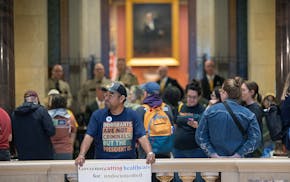In northern Anoka County, large yard signs advertise suburban growth: 270 homes under construction, not far from another 57-home subdivision on the way.
But crossing into the city of Nowthen, markers of residential development fade away. Horses run through sprawling pastures. Residents gather at the historic town hall, in the blink-and-you'll-miss-it commercial district with a plant nursery, Bill's Superette and a few restaurants.
As many suburbs grow around it, Nowthen is fighting to stay the same. Residents like their properties large and their government small. It's a view that led officials to incorporate the then-township into a city in 2008, as they feared encroaching density.
But the cost of maintaining the rural community is quickly rising, pushing leaders to question how the city of 4,500 residents can sustain itself without growth.
"We have a lot of space, but don't have a lot of residents," resident Matt Wessling said. "And that's a double-edged sword."
Nowthen is going through the difficult process of growing up, in the past few years hiring its first city administrator, building its own fire department and working to finally bring high-speed internet to every home. Those efforts have been challenging as the city is roiled by staff turnover and questions about spending.
"I would say the city is still probably just almost past the toddler stage," said Interim City Administrator Natalie Johnson, who after three years is the most experienced administrative employee. "We're still learning the things a city has to do."
Nowthen has entered a fresh chapter, with a new council debating how the city can bring in more money. After a decade, the city has a new mayor, Shane Hybben, who has talked about attracting more businesses and has warned residents that larger tax increases could be on the horizon.
Debates over city finances have stirred tensions, including over whether the city needs a full-time fire chief or should pay for a special election to fill a council seat. Budget items such as unexpected overtime pay have come under intense scrutiny by residents.
"I don't think there's a person here who wants to turn into a densely populated, townhouse-filled, traditional neighborhood with third-of-an-acre lots," said Council Member Dan Swenson, who called Nowthen a "rural oasis in the metro."
"But the challenge is the push and pull of not quite being able to afford services a city might want to provide and the desire to increase that funding."
Creating a city
Residents agreed to incorporate Nowthen as they worried about neighboring suburbs annexing their land and changing its rural feel.
Its name came from the township's first postmaster James Hare, who often used the phrase "now then." Even when it was still Burns Township, residents had attached the name "Nowthen" to a park, church and some businesses. The community is known for its annual Threshing Show and Heritage Festival.
Since incorporating, the city has dodged denser development cropping up across the metro. Many residents want to keep a minimum of 5-acre lots. About half of the roads over the city's 35 square miles are still gravel.
Nowthen has only added a couple hundred residents since it became a city, while its neighbors have grown at a far faster pace. The town is mostly conservative, with more than 70% voting for President Donald Trump last November.
"We've got a pretty simple life out here," former Mayor Jeff Pilon said.
"That's why people say, 'I'm willing to come out here and take care of my own septic and my own well and own property. I'll have tigers until somebody complains,'" he added with a laugh.
A Nowthen resident did have tigers early on in Pilon's term as one of the city's first council members. The city fielded complaints about their roars at night. Officials had to step in to have the big cats removed.
"We're complaint-driven, as long as neighbors are getting along," Pilon said.
It's a small town where regular city business can quickly become personal. Nowthen has dealt with an exodus of staff and ongoing shortages. In recent years it's also worked through a series of problems related to city operations, including reported misspending.
Figuring out how to staff a fire department has been especially controversial. The city split from Ramsey's fire services. It then contracted with the St. Francis fire chief to help start the Nowthen department.
Staff were nearly finished interviewing candidates for the city's first, full-time chief toward the end of last year. But then council members voiced concerns about the cost of paying for a full-time position, given Nowthen's size.
The council pivoted to looking for a part-time chief, which sparked serious concerns among on-call firefighters.
Isaac Schulz, a Nowthen resident and firefighter, told the council they blew up the process and worried the department would be left without a leader. He questioned why the decision wasn't made months earlier.
"We want to continue to argue that we have the lowest tax rate in the county of Anoka. But we cannot continue to budget on a shoestring budget," Schulz said at a meeting.
The council recently named its first chief, part-time.
"If we want to have a population that is rural with a five-acre gross density, where it still feels like the country … That is going to cost money," Schulz said. "Because we don't have the population base. We don't have the businesses."
Spending under scrutiny
The new council recently called off the search for its next city administrator. Members said because the town doesn't offer many services like sewer or water, they could make do with only a clerk.
Hybben moved to cancel the search, as he looks to tackle budget constraints. When he took over as mayor in January, he said the city started the year with a $250,000 budget gap, after a nearly 10% tax levy increase.
"It's about bringing costs back in line," Hybben said, adding that less spending and unbudgeted revenue have helped close the gap. "We have challenges, but we're working through them well."
The increasing pressure of governing a city has at times boiled over in heated debates with neighbors, meetings adjourned early and council members walking out.
In April, neighbors came to a meeting to voice concerns. Hybben informed them there would be no public forum due to the long agenda, but residents argued they deserved a chance to speak.
When the crowd kept talking, the council adjourned the meeting shortly after it started. Residents stood in the parking lot voicing frustrations for more than an hour after.
"I think there's a lot of unnecessary spending and places where things could be pared down and we'd get similar results," said resident Sue Schmit, who gathered with neighbors outside.
Schmit had hoped to talk about the council's decision not to hold a special election this summer to fill a vacant seat. Picking who would serve on the council launched another debate about costs.
Pilon attempted to appoint someone to fill the seat before his mayoral term ended, but two council members walked out, ending the meeting for lack of a quorum.
Earlier this year, the split council agreed to appoint Swenson to fill the seat until a special election in August. But the new council majority reversed course, voting 3-2 against holding the election because of the $10,000 cost and expected low turnout.
"I would prefer a special election, but we do need that $10,000 dollars for other services," said Swenson, who voted with the majority to instead put the seat on the 2026 general election ballot.
The council said their attorney advised it wasn't a conflict for Swenson to vote on his own seat, despite resident pushback.
In May, Hybben held an open forum for residents to share ideas on the city's budget.
Neighbors gathered in the town hall, where chairs are still stamped "Burns Township" and a map covers the wall, displaying how the city's been developed, with two tiny commercial zones marked in red.
"We're juggling a lot right now," Council Member Dan Breyen said. "It's a teeter-totter of do you have more houses so you can increase your tax base? Or do you raise the tax bill of existing residents to try to allow people to have the open spaces they want?"
![Hundreds of trees stand after being charred by the Camp House wildfire in Brimson, Minn. on Thursday, May 15, 2025. ]
ALEX KORMANN • alex.kormann](https://arc.stimg.co/startribunemedia/REGDNXOI4BAUHMNSNQGSM3CQTQ.jpg?h=91&w=145&fit=crop&bg=999&crop=faces)
Northeast Minnesota wildfires haven't grown but aren't contained
Flooding at Rapidan Dam changed a river, lives and recreational area

Brooks: Will American tourists abroad be welcome, or at least tolerated? I found out.

Minneapolis Foundation is suing the EPA over frozen environmental justice grants

